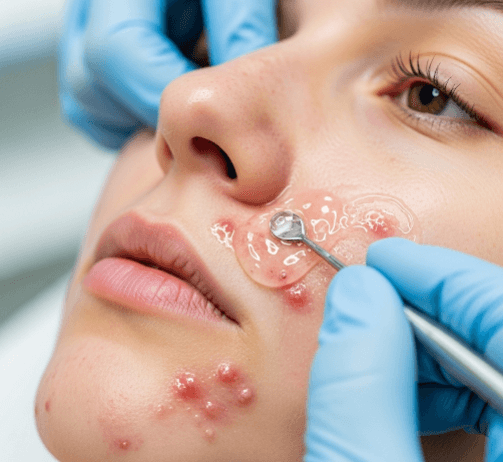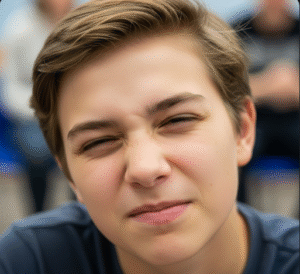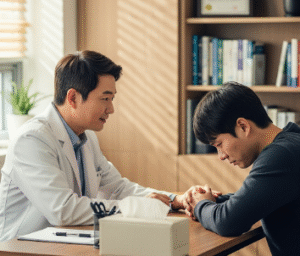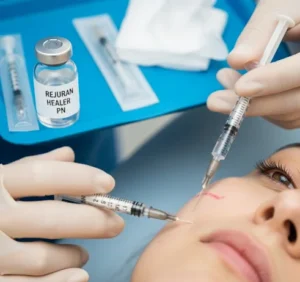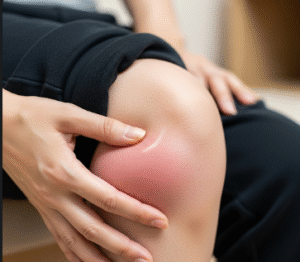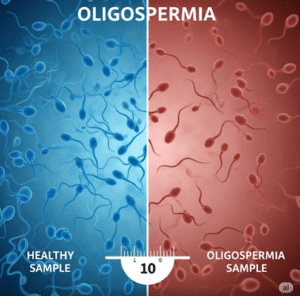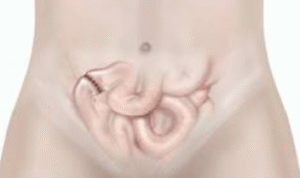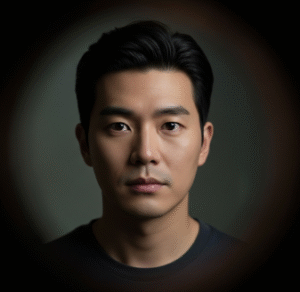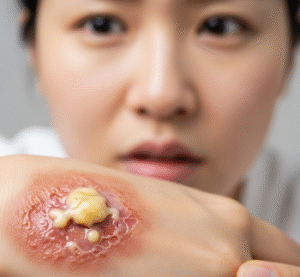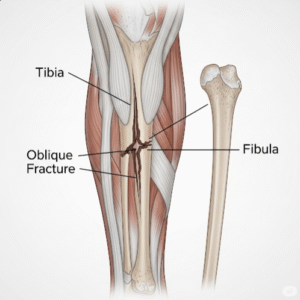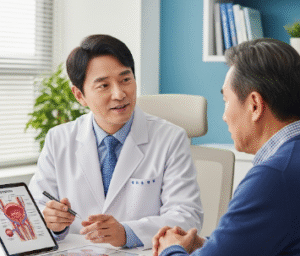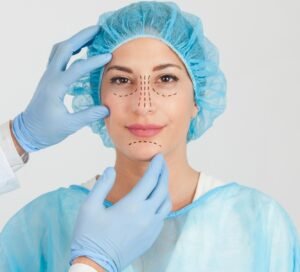What it is
➤ Acne treatment refers to the range of medical and dermatological approaches used to manage and reduce acne, a chronic skin condition characterized by pimples, blackheads, whiteheads, cysts, and nodules.
→ The goal is not only to clear existing breakouts but also to prevent future flare-ups, reduce scarring, and improve overall skin texture.
✦ Acne treatments may include topical medications, oral therapies, advanced dermatologic procedures, and lifestyle modifications, depending on the severity of the condition.
Why it’s done
▸ Medical reasons → Untreated acne can cause permanent scars, pigmentation issues, and cystic lesions.
▸ Psychological reasons → Acne often leads to low self-esteem, anxiety, and depression, especially in adolescents and young adults.
▸ Preventive reasons → Early treatment prevents the worsening of acne and reduces the chance of resistant bacteria developing.
✔ Dermatologists recommend timely intervention when acne:
- Persists beyond adolescence
- Causes painful cysts or nodules
- Leaves dark spots or scars
- Doesn’t improve with over-the-counter products
Alternatives
✦ Acne treatment is multi-layered, and depending on the case, alternatives may include:
➤ Topical treatments
- Retinoids (tretinoin, adapalene) → unclog pores and regulate skin turnover
- Benzoyl peroxide → reduces bacterial activity and inflammation
- Salicylic acid → exfoliates and prevents clogged pores
➤ Oral medications
- Antibiotics (doxycycline, minocycline) → reduce bacteria and inflammation
- Hormonal therapy (oral contraceptives, spironolactone) → balances hormones in women with acne
- Isotretinoin → powerful option for severe or resistant acne
➤ Procedural options
✔ Chemical peels → exfoliate and reduce post-acne pigmentation
✔ Laser therapy → reduces oil production and improves scars
✔ Extraction/facials → professionally clear blackheads and cysts
✔ Microneedling → stimulates collagen and improves acne scars
Preparation
Preparing for acne treatment depends on the type of therapy:
▸ General steps
→ Consult a board-certified dermatologist to assess skin type and severity.
→ Disclose any current medications, allergies, or hormonal conditions.
▸ Before topical/oral treatment
✦ Avoid starting new skincare products without medical advice.
✦ Stop using harsh scrubs or high-strength exfoliants that may irritate the skin.
▸ Before procedural treatments
✔ Avoid sun exposure and tanning beds for at least 2 weeks.
✔ Discontinue retinoids or acids (if instructed) before laser or chemical peels.
✔ Keep skin well-hydrated and avoid makeup on the day of the procedure.
How it’s done
1. Topical Medications
➤ Applied directly to the skin once or twice daily.
→ Treatment starts with low concentrations to minimize irritation.
✦ Results usually appear after 6–8 weeks of consistent use.
2. Oral Medications
▸ Antibiotics are prescribed for moderate to severe acne. They are typically combined with topical treatments to prevent bacterial resistance.
▸ Hormonal therapy works by balancing excess androgens that trigger sebum production.
✔ Isotretinoin is a last-resort but highly effective oral therapy that shrinks oil glands and prevents clogging.
3. Procedural Treatments
✦ Chemical peels → Apply a controlled acid solution to remove outer skin layers, improve texture, and lighten scars.
✦ Laser/light therapy → Targets oil glands and kills acne-causing bacteria.
✦ Drainage and extraction → For large cysts, dermatologists may perform minor surgery to reduce pain and prevent scarring.
✦ Steroid injections → Used for inflamed cysts to quickly reduce swelling.
Recovery
➤ Recovery varies depending on the type of treatment:
▸ Topical/oral medications
✔ Initial purging phase may occur (skin worsens before improving).
✔ Mild dryness, redness, or peeling can last 1–2 weeks.
✔ Full improvement may take 3–6 months.
▸ Chemical peels
→ Redness and peeling for 3–7 days.
→ Avoid sun exposure and use high SPF sunscreen.
▸ Laser treatments
✦ Mild redness and swelling for 24–48 hours.
✦ Results improve gradually over several sessions.
▸ Isotretinoin therapy
✔ Dry lips, skin, and occasional joint pain are common.
✔ Requires regular blood tests to monitor side effects.
✔ Lasting remission possible after a 4–6 month course.
Complications
While acne treatments are generally safe, potential risks include:
➤ Topical treatments
- Redness, irritation, and peeling
- Allergic reactions in sensitive individuals
➤ Oral medications
✦ Antibiotics → risk of resistance, stomach upset, sun sensitivity
✦ Hormonal therapy → risk of blood clots in certain individuals
✦ Isotretinoin → liver issues, dry skin, rare psychiatric side effects
➤ Procedural risks
✔ Chemical peels → hyperpigmentation, prolonged redness
✔ Laser treatments → temporary swelling, rare burns
✔ Steroid injections → skin thinning at the injection site
Treatment Options in Korea
Korea is globally recognized for its advanced dermatology clinics and state-of-the-art technology. Patients from around the world seek acne treatment here due to:
➤ Cutting-edge facilities → Equipped with the latest laser systems, microneedling devices, and chemical peeling techniques.
➤ Experienced dermatologists → Many trained internationally, specializing in scar revision and acne management.
➤ Integrated approach → Clinics often combine K-beauty skincare regimens with medical therapies for optimal results.
✦ Popular treatment centers in Korea include:
- Seoul National University Hospital Dermatology Center → Known for evidence-based acne and scar treatments.
- Asan Medical Center → Offers comprehensive dermatology with hormonal and systemic care options.
- Private skin clinics in Gangnam (e.g., Oracle, Banobagi, ID Dermatology) → Popular among international patients for customized acne protocols, laser therapies, and scar correction.
✔ Many clinics also offer medical tourism services, including translation, online consultations, and post-treatment skincare packages.
Conclusion
➤ Acne treatment is not a one-size-fits-all approach. Options range from simple topical creams to advanced dermatologic procedures.
→ The right treatment depends on acne type, severity, and patient goals.
✦ Korea stands out as a global leader in acne care, offering both medical expertise and aesthetic refinement.
With proper preparation, realistic expectations, and expert guidance, acne can be effectively managed — restoring clearer, healthier skin and confidence.

